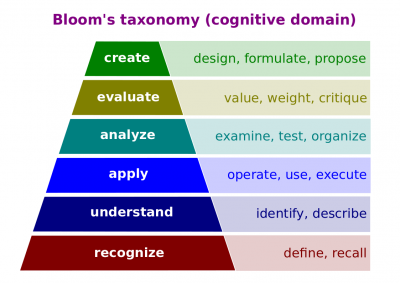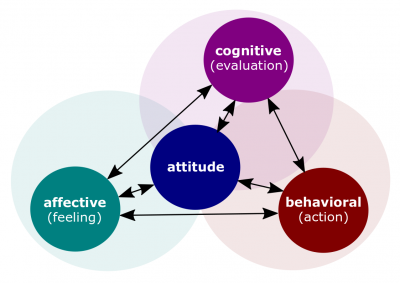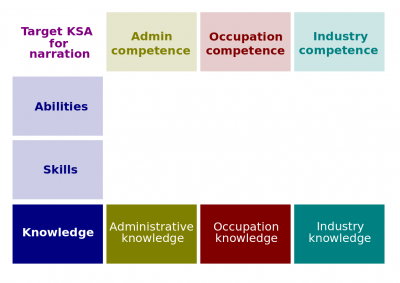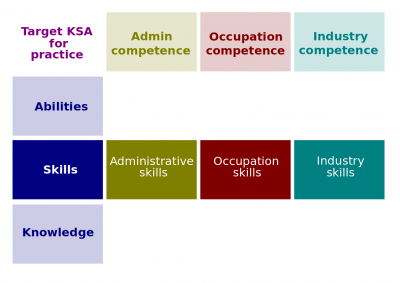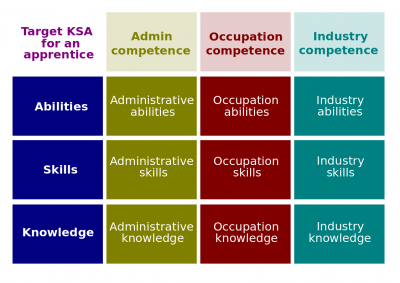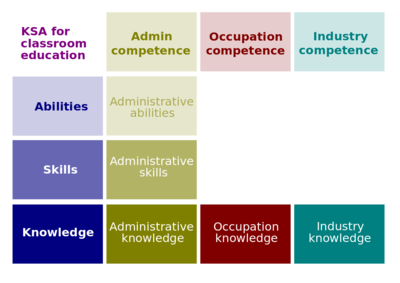Difference between revisions of "Book of KSA Projects"
(→Quiz questions) |
(→Educational Service Providers) |
||
| Line 92: | Line 92: | ||
:'''[[Workforce developer]]'''. Any entity in the business of [[workforce development]].<div style="background-color:#efefef; padding: 5px; margin: 15px;"> | :'''[[Workforce developer]]'''. Any entity in the business of [[workforce development]].<div style="background-color:#efefef; padding: 5px; margin: 15px;"> | ||
| − | :*'''[[Apprentice host employer]]'''. The [[employer]] that hosts one or more [[apprentice]]s. | + | :*'''[[Apprentice host employer]]'''. The [[employer]] that hosts one or more [[apprentice]]s. |
| − | + | :*'''[[Self-education]]''' ([[autodidacticism]], [[autodidactism]], [[self-learning]], [[self-directed learning]], and [[self-teaching]]) is [[education]] without the guidance of masters (such as teachers and professors) or [[educational institution]]s. A self-learner chooses the subject of study, their [[learning tool]]s, and [[educational format]].</div> | |
| − | :'''[[Self-education]]''' ([[autodidacticism]], [[autodidactism]], [[self-learning]], [[self-directed learning]], and [[self-teaching]]) is [[education]] without the guidance of masters (such as teachers and professors) or [[educational institution]]s. A self-learner chooses the subject of study, their [[learning tool]]s, and [[educational format]] | ||
| − | |||
''[[Introduction to Careerprise]] is the successor lecture.'' | ''[[Introduction to Careerprise]] is the successor lecture.'' | ||
Revision as of 16:17, 30 January 2019
Introduction to Education (hereinafter, the Lecture) is a lecture introducing the learners to education and related topics. The Lecture is the fifth of eight lectures of WorldOpp Orientation (hereinafter, the Orientation).
Contents
Outline
Introduction to Careers is the predecessor lecture.
Education Essentials
- Main wikipage: Education Essentials; video (6:03)
- Education. The process and/or product of facilitating one's acquisition of KSAs.
- Formal education (formal training). The education that is delivered in accordance with a formal curriculum and calendar that is officially approved usually by the government or some accreditation body. In most of contemporary countries, formal education consists of compulsory education and post-secondary education.
- Compulsory education. The part of formal education that is imposed by government and, with some exceptions, required of all people. In most of contemporary countries, compulsory education consists of primary education and secondary education.
- Educational objective. A goal of gaining specified knowledge, skills, and abilities by a learner as a result of a specified learning activity or a set of activities. Bloom's taxonomy is one of attempts to classify educational objectives.
- Development domain. One of three domains that group educational objectives according to their bases: (a) cognitive domain for development of knowledge, (b) affective domain for development of emotions, and psychomotor domain for development of actions.
- Cognitive domain. The development domain that groups those educational objectives that target development of knowledge.
- Affective domain. The development domain that groups those educational objectives that target development of emotions.
- Psychomotor domain. The development domain that groups those educational objectives that target development of actions.
Educational Methods
- Main wikipage: Educational Methods; video (8:23)
- Educational method. An established procedure for one's education. These procedures can be grouped in several categories: narrated teaching, practical instruction, cognitive research, experiential learning, or some combination of those.
- Social-learning theory. The view that we can learn through both observation and direct experience.
- Narrated teaching. Any educational method that is based on some narration such as lecturing, storytelling, or demonstrating.
- Lecturing. Any narrated teaching that is based on one or more lectures.
- Storytelling. Any narrated teaching that is based on telling stories related to the subject of learning.
- Demonstrating. Any narrated teaching that is based on one or more demonstrations.
- Practical instruction. Any educational method that is based on prescribed practical exercises related to the subject of learning.
- Hands-on training. Any practical instruction that is based on completion hands-on assignments according to step-by-step instructions.
- Guided experiment. Any practical instruction that is based on executing some experiments according to step-by-step instructions.
- Cognitive research. Any educational method that is based on experience that requires cognitive analysis, synthesis, and/or evaluation of the subject of learning.
- Formative assessment. An educational method that is based on assessment that is formatted to provide detailed feedback afterwards, possibly during debriefing or a lessons learned session. Learners may also be encouraged to either complete specified assessment activities or obtain specified scores on them.
- Substantive discussion. An educational method that is based on one or more discussions on the matters that go beyond conventionally-formalized concepts, possibly followed by debriefing or a lessons learned session.
- Case method. An educational method that is based on usage of decision-forcing cases to put students in the role of people who were faced with difficult decisions at some point in the past. In sharp contrast to many other educational methods, the case method requires that instructors refrain from providing their own opinions about the decisions in question. At the same time, instructor's feedback may be provided during the following debriefing or a lessons learned session.
- Socratic method. An educational method that is based on critical thinking while answering challenging questions related to the subject of learning.
- Experiential learning (learning by doing, learning through play). Any educational method that is based on both direct experience and cognitive reflection on that experience. Those methods may include a wide range of techniques from observations to experiments and heuristic techniques, but the following consideration of what was observed and what can be learned is the key. That methodology may also be defined as learning through reflection on doing.
- Project-based learning (problem-based learning). An educational method that is based on experiential working on real-world projects related to the subject of learning.
- Exploratory research. An educational method that is based on completing one or more researches that relate to the subject of learning, but which procedure cannot be fully prescribed and which results cannot be completely estimated.
- Learning through failure. A heuristic technique to utilize experience for learning.
Learning Environments
- Main wikipage: Learning Environments; video (9:54)
- Educational format. The layout of one's education. This layout include organization of roles, functions, technology, and other arrangements for the educational process.
- Traditional classroom. Any educational format that is based on a regular classroom in which a teacher narrates educational topics while using some board or display for demonstrating and one or more students listen to him or her.
- Flipped classroom. Any educational format that is the opposite of a traditional classroom. The students are supposed to review pre-recorded lectures or use other learning tools outside of the classroom. The teacher usually facilitates learning activities such as practical instruction, cognitive research, and/or experiential learning in the classroom.
- On-the-job training. Any educational format that is based on training provided at the workplace. This training can be anything from time to think on work problems and/or use related learning tools and up to one-on-one mentoring.
- One-on-one mentoring. Any educational format that is based on a relationship between one mentor and one student.
- Study group. Any educational format that is based on a group of students that gathers to learn specified topics. Study circles use a similar format, but their topics are more vague.
- Learning tool. Any tool helpful in learning. Those tools may include (a) printed materials such as books, textbooks, handouts, articles, study guides, technical documentation; (b) audio materials such as audio files, collections, or natural experiences; (c) graphic materials such as illustrations, charts, real objects, photographs; (d) audiovisual materials such as video files, collections, natural and/or multimedia experiences; (e) special software such as learning management systems, MOOCs, collaborative knowledge systems, learning games, etc.
- MOOC. A kind of computer-aided education that represents a massive open online course aimed at unlimited participation and open access via World Wide Web.
- Learning management system. A system such as CNM Campus for the administration, documentation, tracking, reporting and delivery of educational courses, training programs, or learning and development programs. Usually, this system is built on learning management software such as CNM Courseware.
- Collaborative knowledge system. A system such as CNM Wiki for collaborative design, development, and delivery of knowledge. Usually, this system is built on content management software such as CNM Wikiware.
- Learning arrangement. A particular way in which learning tools, educational formats, educational methods, elicitation and other techniques are put together in order to facilitate one's learning. The arrangements may include learning games, competitions, role plays, simulations, field trips, and other settings arranged to stimulate one's observations and direct experiences.
- Computer-aided education. Any educational format that uses learning management system based on some software. This format can complement any other learning arrangement.
- Internship. A period of professional experience offered by an organization for a limited period of time to students enrolled into programs related to that profession. Internship can be considered as a complement to formal education; for some students, especially those in the medical field, internship is a requirement for an educational credential.
- Gap year. A one-year hiatus from academic studies to allow for nonacademic, usually experiential learning activities.
- Apprenticeship. An arrangement in which someone called an apprentice learns on the job and, often, at some educational institution. Apprenticeship can also refer to the position of an apprentice.
- Elicitation technique. An established procedure for gathering enterprise data from human beings. Elicitation techniques are used in anthropology, cognitive science, counseling, education, knowledge engineering, linguistics, management, philosophy, psychology, and other fields. A person who interacts with human subjects in order to elicit information from them is called an elicitor. The most common techniques include interviews, brainstorming, focus groups, artifact testing, observation, and questionnaire survey.
Educational Credentials
- Main wikipage: Educational Credentials; video (8:38)
- Educational credential. A credential that confirms one's education. Some educational institutions offer educational programs especially in creative arts and the medical field that combine credentialing of academic achievements and professional experience.
- Registered apprenticeship. In the United States, apprenticeship that is registered and overseen by a government organization. In some states, this organization is the United States Department Of Labor; similar state bodies register and oversee registered apprenticeships in the other states. Those organizations issue educational credentials to the graduates from the registered apprenticeships.
- Academic credential. An educational credential that is issued by an educational institution or credentialing organization to certify specific academic achievements traditionally related to someone's knowledge.
- High school diploma. An academic credential that certifies that someone has been graduated from a high school.
- GED (General Equivalency Diploma). A credential that certifies that someone has successfully passed the test that covers United States or Canadian high school-level academic skills.
- Diploma. A certificate or deed issued by an educational institution, such as college or university, that testifies that the recipient has successfully completed a particular course of study.
- Associate degree (or associate's degree). An undergraduate academic degree awarded by colleges and universities upon completion of a course of study intended to usually last two years or more.
- Bachelor's degree. An undergraduate academic degree awarded by colleges and universities upon completion of a course of study lasting three to seven years depending on institution and academic discipline.
- Master's degree. A graduate academic degree awarded by colleges and universities upon completion of a course of study lasting one to three years beyond the coursework required by a Bachelor's degree.
- PhD (Doctor of Philosophy, also known as PhD degree or Ph.D.). The highest, terminal academic degree awarded by universities in most countries. The requirements to earn a PhD regularly include comprehensive examinations and work on thesis or dissertation based on extensive research.
- Professional degree. A degree that prepares someone to work in a particular profession, often meeting the academic requirements for licensure or accreditation.
- Credentialism (academic inflation). The process of the devaluation of educational qualifications because of the needs of educational institutions to increase revenues and cut expenses, on one side, and increasing demands, on the other side. This process further provokes credential creep.
Educational Service Providers
- Main wikipage: Educational Service Providers; video (5:29)
- Educational institution. An enterprise, usually an organization or its constituent part, that exists in order to provide the public with education.
- Preschool (nursery school, kindergarten). An educational institution that offers early childhood education to children before they begin compulsory education at primary school.
- Elementary school (primary school). An educational institution that offers initial or primary compulsory education, in the United States and Canada, from the age of about seven to twelve. Students usually attend elementary school after preschool and before secondary school.
- Secondary school (in the United States, a combination of middle school and high school). An educational institution that offers compulsory education beyond its primary level that is offered at elementary school. In the United States and Canada, the students of secondary schools are from the age of about twelve to eighteen.
- Tertiary school (college, university, post-secondary school). An educational institution that facilitates learning beyond compulsory education and awards academic credentials higher than high school diplomas.
- Vocational school (trade school, career center, or vocational college). An educational institution that facilitates learning beyond compulsory education, but does not award academic credentials higher than high school diplomas. Instead, vocational schools concentrate on those occupations that do not require advanced academic credentials and those KSAs that are needed in order to start working in those occupations.
- Workforce developer. Any entity in the business of workforce development.
- Apprentice host employer. The employer that hosts one or more apprentices.
- Self-education (autodidacticism, autodidactism, self-learning, self-directed learning, and self-teaching) is education without the guidance of masters (such as teachers and professors) or educational institutions. A self-learner chooses the subject of study, their learning tools, and educational format.
Introduction to Careerprise is the successor lecture.
Materials
Recorded audio
Recorded video
- https://youtu.be/LrUmDbuDfFc (lecture preview)
Video Text
Introduction to Education Preview
